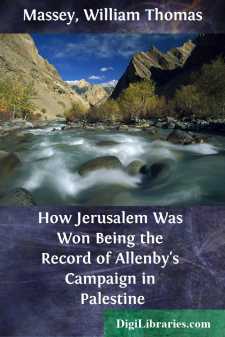Categories
- Antiques & Collectibles 13
- Architecture 36
- Art 48
- Bibles 22
- Biography & Autobiography 813
- Body, Mind & Spirit 138
- Business & Economics 28
- Children's Books 12
- Children's Fiction 9
- Computers 4
- Cooking 94
- Crafts & Hobbies 4
- Drama 346
- Education 46
- Family & Relationships 57
- Fiction 11821
- Games 19
- Gardening 17
- Health & Fitness 34
- History 1377
- House & Home 1
- Humor 147
- Juvenile Fiction 1873
- Juvenile Nonfiction 202
- Language Arts & Disciplines 88
- Law 16
- Literary Collections 686
- Literary Criticism 179
- Mathematics 13
- Medical 41
- Music 40
- Nature 179
- Non-Classifiable 1768
- Performing Arts 7
- Periodicals 1453
- Philosophy 64
- Photography 2
- Poetry 896
- Political Science 203
- Psychology 42
- Reference 154
- Religion 505
- Science 126
- Self-Help 81
- Social Science 81
- Sports & Recreation 34
- Study Aids 3
- Technology & Engineering 59
- Transportation 23
- Travel 463
- True Crime 29
How Jerusalem Was Won Being the Record of Allenby's Campaign in Palestine
Categories:
Description:
Excerpt
CHAPTER I
PALESTINE'S INFLUENCE ON THE WAR
In a war which involved the peoples of the four quarters of the globe it was to be expected that on the world's oldest battleground would be renewed the scenes of conflict of bygone ages. There was perhaps a desire of some elements of both sides, certainly it was the unanimous wish of the Allies, to avoid the clash of arms in Palestine, and to leave untouched by armies a land held in reverence by three of the great religions of the world. But this ancient cockpit of warring races could not escape. The will of those who broke the peace prevailed. Germany's dream of Eastern Empires and world domination, the lust of conquest of the Kaiser party, required that the tide of war should once more surge across the land, and if the conquering hosts left fewer traces of war wreckage than were to be expected in their victorious march, it was due not to any anxiety of our foes to avoid conflict about, and damage to, places with hallowed associations, but to the masterly strategy of the British Commander-in-Chief who manoeuvred the Turkish Armies out of positions defending the sacred sites.
The people of to-day who have lived through the war, who have had their view bewildered by ever-recurring anxieties, by hopes shattered and fears realised, by a succession of victories and defeats on a colossal scale, and by a sudden collapse of the enemy, may fail to see the Palestine campaign in true perspective. But in a future generation the calm judgment of the historian in reviewing the greatest of all wars will, if I mistake not, pay a great tribute to General Allenby's strategy, not only as marking the commencement of the enemy's downfall, but as preserving from the scourge of war those holy places which symbolise the example by which most people rule their lives. Britons who value the good name of their country will appreciate what this means to those who shall come after usвÐâthat the record of a great campaign carried out exclusively by British Imperial troops was unsullied by a single act to disturb the sacred monuments, and left the land in the full possession of those rich treasures which stand for the principles that guided our actions and which, if posterity observes them, will make a better and happier world.
A few months after the Turks entered the war it was obvious that unaided they could never realise the Kaiser's hope of cutting the Suez Canal communications of the British Empire. The German commitments in Europe were too overwhelming to permit of their rendering the Turks adequate support for a renewed effort against Egypt after the failure of the attack on the Canal in February 1915. There was an attempt by the Turks in August 1916, but it was crushed by Anzac horse and British infantry at Romani,[1] a score of miles from Port Said, and thereafter the Turks in this theatre were on the defensive. Some declare the Dardanelles enterprise to have been a mistake; others believe that had we not threatened the Turks there Egypt would have had to share with us the anxieties that war brings alike upon attackers and defenders....


